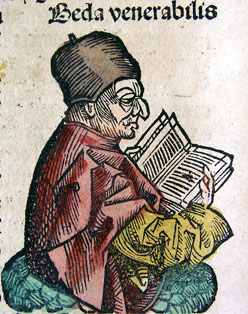Word-curious Apple Lady that I am, I naturally wondered, why is it called "Easter" anyway? The Christian celebration has to do with Jesus being raised from the dead, but the word for it seems to have nothing to do with any of those concepts. So where does the word "Easter" come from?
This is about our how culture celebrates Easter: a little bit Christian, a little bit pagan.
(Photo from Discovery News)
- The answer, I'm afraid, is rather iffy.
- I consulted my compact edition of the Oxford English Dictionary (my favorite reference tool ever), and it gave me an uncharacteristically confusing answer. I'll spare you the heavily abbreviated and perplexing details and rather summarize the illuminating explanations provided elsewhere.
- The word "Easter" comes from a whole lot of old Germanic words that, in lower case form, refer to the place where the sun rises, or the dawn itself.
- The Venerable Bede, or Baeda, who was a priest living in a monastery in Northumbria, England around 700 A.D. provided an additional definition. He wrote a number of books, some of them histories, some of them Biblical commentaries.

Venerable Bede, or Baeda, a priest from Northumbria who wrote down a lot of stuff.
(Image from NNDB)
- In one of his books, he said that back before his time, before there were any monasteries in Northumbria, or before there was much practice of Christianity there at all, the month of April was called Eosturmonath, or the month (monath) of Eostre.
- Eostre, he said, was the name of a pagan goddess of the dawn (or perhaps spring, depending on your translation of Bede), and that pagan worshippers used to celebrate her feast day on the first day of Spring.
- Well, if he's correct, that means the most sacred of days on the Christian calendar is named for a pagan festival.

Artist's depiction of the supposed goddess Eostre, by Jacques Reich, 1909. The artist associated her with all sorts of spring-like things: flower petals, babies, rabbits, the stork.
(Image from Wikipedia)
- That's not very unusual, actually; all sorts of Christian holidays are linked in some fashion with pagan celebrations. I suppose the only reason I find this startling is because I never heard anyone talk about this before. Sure, there are bunnies and egg-dyeing (as opposed to egg dying, something any expectant mother would lament) but I never heard anybody say that the very name of the thing refers to a pagan feast.
- But, as it turns out, the Venerable Bede might have made the whole thing up. Nobody can find much evidence of this supposed Eostre goddess.
- Jacob Grimm, (yes, one of the Brothers Grimm), confirmed Bede's story but only in a word-origin sense. He said it seemed like the word for the goddess came from a particular Old High German word ostar. But he did not say he saw any evidence of the existence of the goddess or actual celebrations carried out in her honor.
- Scholars still debate whether any goddess named Eostre or Ostara ever existed in the way-back day. Some say they have found evidence; others say the evidence is still rather scant.
- So the jury is still out about whether there was a goddess named Eostre.
- But our word "Easter" today does come from those original lower-case root words: the place where the sun rises, or the dawn itself. And therefore, beginnings.

Sunrise. New Day. Fresh start. Also, Easter.
(Photo from Wikimedia Commons)
Happy Easter, everybody.
Sources
My copy of The Oxford English Dictionary
Association of Polytheist Traditions, Eostre and Easter Customs
All About History, Origin of the Word Easter
About.com Paganism/Wicca, History of Ostara - The Spring Equinox
NNDB, Venerable Bede
confusing, what does happy easter has to do to with christ ? why are we celebrating we should gather together with love ones and ask for forgiveness and pray for those less unfortune and amin our faults.
ReplyDeletein many countries they have a week to pray for Jesus we don't celebrate... we pray, the concept behind the eggs and the bunny has taking this in another direction of what it is real and has giving our new generation a diferent view of what this week is all about...
every day we have to remind our self that without this event, we probably would have not have the open gates to heaven. ( PRAY )
Charming blood cult you're in.
Delete